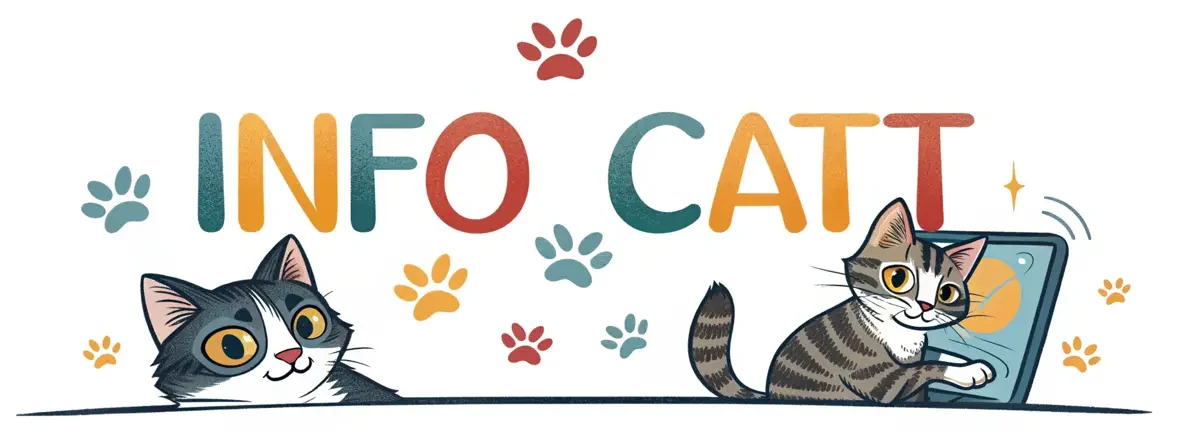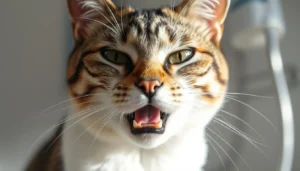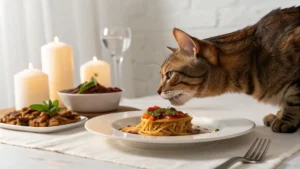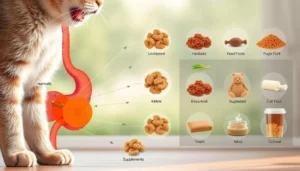Seeing your cat throw up undigested food is scary. It makes you worry if something is really wrong. Many cat owners feel the same way when their pets vomit after eating.
It’s important to know why your cat is vomiting. Sometimes, it’s just a normal thing. But if it keeps happening, it might mean there’s a bigger problem. This guide will help you understand and fix the issue, keeping your cat healthy.
Understanding Normal vs. Abnormal Cat Vomiting Patterns
Cat owners often worry when their feline friend starts throwing up. It’s important to know the difference between normal and concerning vomiting. This can help protect your cat’s health. Not all vomiting is a reason to panic, but knowing the signs is key.
Cats throw up for many reasons, and some are more serious than others. Understanding why cats vomit can help you know when to relax and when to seek vet care.
👉 Differences Between Regurgitation and Vomiting
Regurgitation and vomiting are different:
- Regurgitation is passive – food comes back up with little effort
- Vomiting involves muscular contractions and looks more forceful
- Regurgitated food appears mostly undigested
- Vomit is typically more liquid and may contain bile
👉 When Cat Vomiting Becomes a Concern
If your cat throws up but acts normal, it might not be an emergency. But watch for these warning signs:
- Frequent vomiting (more than once a week)
- Presence of blood in vomit
- Accompanied by weight loss
- Loss of appetite
- Lethargy or significant behavior changes
👉 Common Vomiting Patterns to Watch For
Some cats vomit occasionally due to hairballs or eating too fast. Occasional, isolated incidents are typically not cause for alarm. Look at frequency, consistency, and symptoms to decide if vet care is needed.
Remember: Your cat’s health is unique. When in doubt, always consult with a professional veterinarian.
Why Is My Cat Throwing Up Undigested Food: Common Causes Explained
It can be confusing when your cat throws up undigested food. Several things might cause this problem. Food intolerance in cats is a big reason for digestive issues.
Cats vomit for many reasons. Let’s look at the main causes:
- Rapid eating habits that prevent proper digestion
- Sensitive stomach or food allergies
- Intestinal blockages
- Stress-related digestive issues
Some cats have food intolerance. This makes them reject certain foods right away. Their stomach might not handle certain proteins or additives well.
Diet changes or low-quality food can upset their stomach. Watch how your cat reacts to different foods. This can help find what makes them vomit undigested food.
A cat’s digestive health shows their overall health and what they eat.
If your cat keeps throwing up undigested food, see a vet. They can find the cause and suggest better food for your cat.
Medical Conditions That Trigger Food Regurgitation in Cats
Knowing why cats vomit can help you know when to take them to the vet. Many health issues can make your cat throw up undigested food. This shows there might be a bigger problem that needs a vet’s help.
Cats face many health problems that can lead to vomiting. It’s important to know these causes to keep your pet healthy.
Gastrointestinal Disorders
Problems with the digestive system can affect how your cat eats. Some common issues include:
- Inflammatory Bowel Disease (IBD)
- Gastritis
- Intestinal parasites
- Bacterial infections
Food Allergies and Sensitivities
Food can also cause unexpected vomiting in cats. Your pet might have:
- Protein intolerance
- Grain sensitivity
- Adverse reactions to specific ingredients
Underlying Health Issues
Some serious health problems can show up as vomiting. These include:
- Kidney disease
- Thyroid problems
- Liver dysfunction
- Pancreatitis
If your cat vomits a lot or it worries you, see a vet. Early treatment can stop bigger health problems.
Behavioral Reasons Behind Your Cat’s Vomiting Habits
Why does your cat throw up whole food? It often comes down to behavior. Cats have complex emotions that affect their health. Stress and anxiety can make them vomit undigested food.
Your cat’s surroundings and daily life can cause vomiting. Some common reasons include:
- Sudden changes in home environment
- Introduction of new pets or family members
- Disrupted feeding schedules
- Emotional distress or anxiety
Cats are very sensitive to emotional changes. Is it normal for cats to vomit undigested food when stressed? Yes, it is. Their digestive system can quickly react to stress, leading to vomiting.
If your cat vomits often, check their emotional state. A stable, predictable home can help reduce stress-related vomiting. Gentle routines, quiet spots, and regular feeding times can help.
“A calm cat is a healthy cat” – Veterinary Behavioral Specialists
Look for signs of anxiety like too much grooming, hiding, or changes in how they sound. These signs might show stress that leads to vomiting.
Diet-Related Factors That Lead to Undigested Food Vomiting
Understanding what makes your cat vomit can help prevent digestive issues. If your cat throws up after eating, several diet factors might be the cause.
Impact of Eating Too Fast
Cats who eat quickly often vomit undigested food. This fast eating can lead to several problems:
- Swallowing large food chunks without proper chewing
- Increased air intake during fast eating
- Overwhelming the digestive system
To stop cats from vomiting due to speed eating, consider using specialized slow-feed bowls. You can also spread food across a wider surface to reduce consumption rate.
Wrong Food Temperature
Temperature is key for your cat’s digestive comfort. Serving food directly from the refrigerator can shock their digestive system. Serve wet food at room temperature to prevent vomiting.
Inappropriate Food Choices
Not all cat foods are good for them. Some ingredients can cause digestive distress and lead to vomiting. Choose high-quality proteins and avoid unnecessary fillers. Also, talk to your vet about the best food for your cat.
Pro tip: Gradually transition between cat food brands to minimize digestive upset.
When to Seek Immediate Veterinary Care
Knowing when to see a vet for cat vomiting can save your furry friend’s life. Some signs your cat’s vomiting is serious need immediate medical attention. Spotting these critical symptoms can greatly improve your cat’s health and recovery.
You should rush to the veterinarian if your cat shows any of these alarming signs:
- Vomiting blood or dark, coffee-ground-like material
- Persistent vomiting lasting more than 24 hours
- Extreme lethargy or weakness
- High fever (over 103°F)
- Significant weight loss
- Inability to keep water or food down
Certain red flags demand urgent professional evaluation. Projectile vomiting, severe abdominal pain, or distension could indicate a life-threatening condition. Cats showing signs of dehydration – such as sunken eyes, dry gums, or reduced skin elasticity – need immediate veterinary intervention.
Your cat’s health is precious. When in doubt, always consult a professional.
Young kittens, senior cats, and those with pre-existing health conditions are more vulnerable. Their immune systems might struggle more with vomiting episodes. This makes prompt medical care crucial for their survival and well-being.
Prevention and Management Strategies
Dealing with a cat that throws up food can be frustrating. But, there are ways to stop it and make your cat feel better. These strategies can improve your cat’s digestive health.
To tackle cat vomiting, you need to look at your pet’s diet and environment. This approach covers all bases.
👉 Dietary Adjustments
Here are some important changes to make in your cat’s diet:
- Switch to a high-quality, easily digestible cat food
- Choose smaller kibble sizes for easier eating
- Opt for limited ingredient diets if food sensitivities are suspected
- Introduce wet food to increase moisture intake
👉 Feeding Schedule Modifications
Good eating habits can help reduce vomiting:
- Use slow-feed bowls to prevent rapid eating
- Divide daily food portions into smaller, more frequent meals
- Establish consistent feeding times
- Avoid feeding immediately after intense play or exercise
👉 Environmental Changes
Your cat’s surroundings are key to their digestive health:
- Reduce stress by maintaining a calm home environment
- Provide multiple quiet feeding areas
- Keep food and water bowls clean
- Minimize sudden changes in routine
By using these strategies, you can help your cat stop vomiting. This will also improve their overall digestive health.
Conclusion
Figuring out why your cat throws up undigested food can be tough. But, with the right info, you can keep your cat healthy. We’ve looked at many reasons for cat vomiting, from health issues to what they eat.
Wondering how to help a cat that throws up food? Remember, watching your cat closely and getting vet advice is important. Every cat is different. So, notice how they eat, act, and feel to spot any problems.
Preventing vomiting is better than treating it. Use good feeding methods, manage their diet, and keep their environment calm. Also, regular vet visits help catch health issues early.
Your love and care are key to your cat’s health. Keep learning, watch your cat closely, and get vet help if problems persist. This way, you can help your cat stay healthy.
FAQ
Why is my cat throwing up undigested food?
Cats might throw up undigested food for many reasons. This includes eating too fast, food allergies, or stomach problems. It could also be due to stress or other health issues. Sometimes, it’s just because they eat too quickly or don’t like the food.
Is it normal for cats to vomit occasionally?
It’s okay if your cat vomits sometimes. But if it happens a lot, it’s a worry. If your cat is healthy and only vomits once in a while, it might not be serious. But if they keep vomiting, you should take them to the vet to check for health problems.
How can I prevent my cat from throwing up after eating?
To stop your cat from vomiting, try a few things. Use slow-feed bowls to slow them down. Give them smaller meals and make sure they’re not stressed. Check if they have food allergies and feed them at the same time every day. Also, try feeding them from a higher place to help them digest better.
When should I be worried about my cat’s vomiting?
You should worry if your cat keeps vomiting, seems tired, or has blood in their vomit. Also, if they lose weight, stop eating, or act very weak. These are signs they need a vet.
Could food allergies be causing my cat to throw up?
Food allergies can make cats vomit a lot. Signs include vomiting, diarrhea, skin problems, and changes in appetite. If you think this, talk to your vet about an elimination diet to find out what’s causing it.
How can I tell if my cat is regurgitating or vomiting?
Regurgitation is easy and happens right after eating. It’s like a tube of undigested food. Vomiting is harder and includes partially digested food or liquid. Knowing the difference can help figure out why it’s happening.
Are certain cat breeds more prone to vomiting?
Some breeds like Siamese and Persian cats might get sick more often. Cats with flat faces might vomit more because of how they eat and digest.
Can stress cause my cat to throw up undigested food?
Yes, stress can make cats sick. Changes, new pets, or moving can upset them. Keeping their environment calm and steady can help prevent digestive problems caused by stress.



